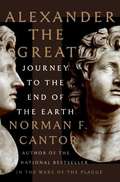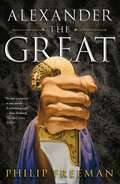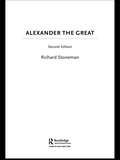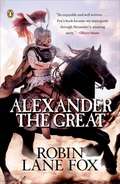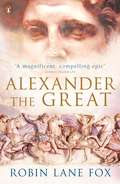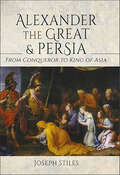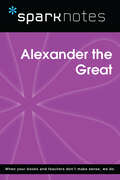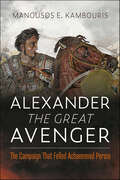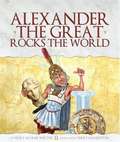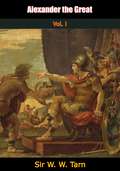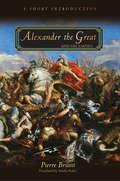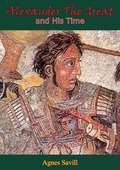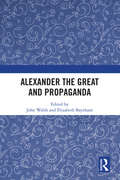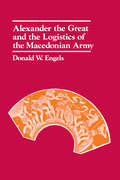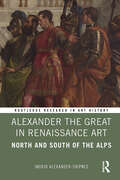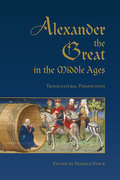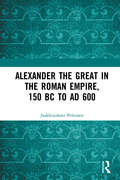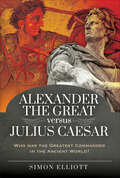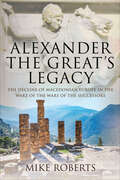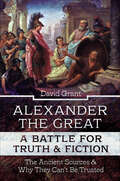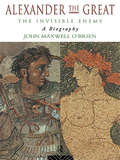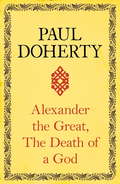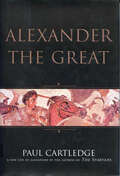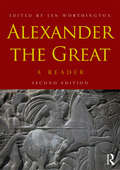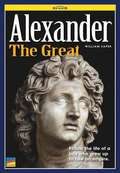- Table View
- List View
Alexander the Great
by Norman Cantor"Alexander's behavior was conditioned along certain lines -- heroism, courage, strength, superstition, bisexuality, intoxication, cruelty. He bestrode Europe and Asia like a supernatural figure." In this succinct portrait of Alexander the Great, distinguished scholar and historian Norman Cantor illuminates the personal life and military conquests of this most legendary of men. Cantor draws from the major writings of Alexander's contemporaries combined with the most recent psychological and cultural studies to show Alexander as he was -- a great figure in the ancient world whose puzzling personality greatly fueled his military accomplishments. He describes Alexander's ambiguous relationship with his father, Philip II of Macedon; his oedipal involvement with his mother, the Albanian princess Olympias; and his bisexuality. He traces Alexander's attempts to bridge the East and West, the Greek and Persian worlds, using Achilles, hero of the Trojan War, as his model. Finally, Cantor explores Alexander's view of himself in relation to the pagan gods of Greece and Egypt. More than a biography, Norman Cantor's Alexander the Great is a psychological rendering of a man of his time.
Alexander the Great
by Philip FreemanIn the first authoritative biography of Alexander the Great written for a general audience in a generation, classicist and historian Philip Freeman tells the remarkable life of the great conqueror. The celebrated Macedonian king has been one of the most enduring figures in history. He was a general of such skill and renown that for two thousand years other great leaders studied his strategy and tactics, from Hannibal to Napoleon, with countless more in between. He flashed across the sky of history like a comet, glowing brightly and burning out quickly: crowned at age nineteen, dead by thirty-two. He established the greatest empire of the ancient world; Greek coins and statues are found as far east as Afghanistan. Our interest in him has never faded. Alexander was born into the royal family of Macedonia, the kingdom that would soon rule over Greece. Tutored as a boy by Aristotle, Alexander had an inquisitive mind that would serve him well when he faced formidable obstacles during his military campaigns. Shortly after taking command of the army, he launched an invasion of the Persian empire, and continued his conquests as far south as the deserts of Egypt and as far east as the mountains of present-day Pakistan and the plains of India. Alexander spent nearly all his adult life away from his homeland, and he and his men helped spread the Greek language throughout western Asia, where it would become the lingua franca of the ancient world. Within a short time after Alexander&’s death in Baghdad, his empire began to fracture. Best known among his successors are the Ptolemies of Egypt, whose empire lasted until Cleopatra. In his lively and authoritative biography of Alexander, classical scholar and historian Philip Freeman describes Alexander&’s astonishing achievements and provides insight into the mercurial character of the great conqueror. Alexander could be petty and magnanimous, cruel and merciful, impulsive and farsighted. Above all, he was ferociously, intensely competitive and could not tolerate losing—which he rarely did. As Freeman explains, without Alexander, the influence of Greece on the ancient world would surely not have been as great as it was, even if his motivation was not to spread Greek culture for beneficial purposes but instead to unify his empire. Only a handful of people have influenced history as Alexander did, which is why he continues to fascinate us.
Alexander the Great
by Richard StonemanAlexander the Great by Richard Stoneman is an introduction to the career and impact of the great Macedonian conqueror and the main themes of his reign. As well as tackling problems of interpretation, the author includes: an examination of the written and other sources and the problems of working with them discussion of archaeological and numismatic evidence an outline of the Macedonian background insight into Alexander's education and ideas exploration of Alexander's claim to divinity assessment of Alexander's short and long-term achievements a study of his influence in antiquity.
Alexander the Great
by Robin Lane FoxRobin Lane Fox's superb account searches through the mass of conflicting evidence and legend to focus on Alexander as a man of his own time. Combining historical scholarship and acute psychological insight, it brings this colossal figure vividly to life.
Alexander the Great
by Robin Lane FoxTough, resolute, fearless, Alexander was a born warrior and ruler of passionate ambition who understood the intense adventure of conquest and of the unknown. When he died in 323 BC aged thirty-two, his vast empire comprised more than two million square miles, spanning from Greece to India. His achievements were unparalleled - he had excelled as leader to his men, founded eighteen new cities and stamped the face of Greek culture on the ancient East. The myth he created is as potent today as it was in the ancient world. Robin Lane Fox's superb account searches through the mass of conflicting evidence and legend to focus on Alexander as a man of his own time. Combining historical scholarship and acute psychological insight, it brings this colossal figure vividly to life.
Alexander the Great & Persia: From Conqueror to King of Asia
by Joseph StilesUpon his return from India, Alexander the Great travelled to the Persian royal city of Pasargadae to pay homage at the tomb of King Cyrus, founder of the Achaemenid Persian Empire, whom he admired greatly. Disgusted to find Cyrus’ tomb desecrated and looted, the Macedonian king had the tomb guards tortured, the Persian provincial governor executed and the tomb refurbished. This episode involving Cyrus’ tomb serves as one of many case studies in Alexander’s relationship with Persia. At times Alexander would behave pragmatically, sparing his defeated enemies and adopting Persian customs. Sisygambis, the mother of Persian King Darius III, allegedly came to view Alexander as a son and starved herself at the news of his demise. On other occasions he did not shy away from destruction (famously torching the palace at Persepolis) and cruelty, earning himself the nickname ‘the accursed’. This conflicting nature gives Alexander a complex legacy in the Persian world. Joseph Stiles explores Alexander the Great’s fascinating relationship with his ‘spear-won’ empire, disentangling the motives and influences behind his policies and actions as ‘King of Asia’.
Alexander the Great (SparkNotes Biography Guide)
by SparkNotesAlexander the Great (SparkNotes Biography Guide) Making the reading experience fun! SparkNotes Biography Guides examine the lives of historical luminaries, from Alexander the Great to Virginia Woolf. Each biography guide includes: An examination of the historical context in which the person lived A summary of the person&’s life and achievements A glossary of important terms, people, and events An in-depth look at the key epochs in the person&’s career Study questions and essay topics A review test Suggestions for further reading Whether you&’re a student of history or just a student cramming for a history exam, SparkNotes Biography guides are a reliable, thorough, and readable resource.
Alexander the Great Avenger: The Campaign that Felled Achaemenid Persia
by Manousos E. KambourisManousos Kambouris’ detailed analysis explains that it was Alexander’s intelligent use of his modernized forces that allowed him to dictate the course of the campaign. Since 500 BC the mainland Greeks had been threatened by the Achaemenid Persian Empire. They had suffered major invasions but subsequent attempts to take the offensive had been thwarted. With Alexander the Great’s invasion the rules changed. In Macedonia a new model army had been developed, taking the traditional hoplite heavy infantry in a new evolutionary direction and similarly transforming the heavy cavalry. These developments neutralized the Persians’ own efforts to modernize their troops, tactics and equipment. Despite the inclusion of a state-of-the-art siege train, the structure of the reformed Macedonian army allowed an unprecedented operational tempo. Manousos Kambouris’ detailed analysis explains that it was Alexander’s intelligent use of these forces, that allowed him to dictate the course of the campaign. His excellent strategic and operational decision-making, based on an intimate knowledge of geography and logistics, along with well-timed movements and clever feints, allowed him to choose his battles, which he then won by tactical brilliance and guts. The author does not neglect to assess the Persian capabilities and decision making, concluding that Darius III was not as inept as often thought. Indeed, he may have been the most militarily capable King of Kings but it was his misfortune to be pitted against the genius of Alexander, the great avenger.
Alexander the Great Rocks the World
by Vicky Alvear ShecterSixteen-year-old Alexander was left in charge of Macedon when his father, the king, went on a business trip. When a barbarian tribe attacked Macedon, Alexander led the army against them, and won! By 18, Alexander was named a general of the army; at 20 he ruled all of Ancient Greece; at 25 he had conquered most of ancient Persia. By 32, he was really King of the World!
Alexander the Great Vol. I (Alexander the Great #1)
by Sir W. W. Tarn‘Tarn’s Alexander the Great, first published in 1948, has become a classic and its importance for subsequent Alexander studies can hardly be exaggerated. Based on a lifetime’s work and elegantly and persuasively written, both volumes evoked immediate admiration—and very soon sharp reaction. Little has in fact appeared on Alexander over the last thirty years that has not been directly related to Tarn’s book. Especially Volume II, with its detailed analysis of the sources and discussion of the main historical cruces—such as Cleitarchus’ date, the status of the Greek cities, Alexander’s deification, his supposed plans for a world-kingdom and the famous thesis that he sought to realise the ‘brotherhood of mankind’-has itself inspired scores of books and articles. For the scholar both volumes are indispensable and their reappearance is to be warmly welcomed.’—FRANK W. WALBANK‘The appearance of Tarn’s Alexander...is an epoch-making event, in the strictest sense of the words. Every serious student of Alexander, probably for generations, will have to start from Tarn’s analysis of the sources and discussion of the chief problems of the narrative; and any writer on Alexander who did not enjoy the advantage of being able to consult this work will regret it. These volumes contain the distilled and matured results of a great scholar’s lifelong devotion to his great subject.’—Journal of Hellenic Studies 1948
Alexander the Great and His Empire
by Amélie Kuhrt Pierre BriantThis is the first publication in English of Pierre Briant's classic short history of Alexander the Great's conquest of the Persian empire, from the Mediterranean to Central Asia. Eschewing a conventional biographical focus, this is the only book in any language that sets the rise of Alexander's short-lived empire within the broad context of ancient Near Eastern history under Achaemenid Persian rule, as well as against Alexander's Macedonian background. As a renowned historian of both the Macedonians and the Persians, Briant is uniquely able to assess Alexander's significance from the viewpoint of both the conquerors and the conquered, and to trace what changed and what stayed the same as Alexander and the Hellenistic world gained ascendancy over Darius's Persia. After a short account of Alexander's life before his landing in Asia Minor, the book gives a brief overview of the major stages of his conquest. This background sets the stage for a series of concise thematic chapters that explore the origins and objectives of the conquest; the nature and significance of the resistance it met; the administration, defense, and exploitation of the conquered lands; the varying nature of Alexander's relations with the Macedonians, Greeks, and Persians; and the problems of succession following Alexander's death. For this translation, Briant has written a new foreword and conclusion, updated the main text and the thematic annotated bibliography, and added a substantial appendix in which he assesses the current state of scholarship on Alexander and suggests some directions for future research. More than ever, this masterful work provides an original and important perspective on Alexander and his empire.
Alexander the Great and His Time: [Second Edition]
by Dr Agnes SavillThis is a full study of the work and personality, the successes and failures of Alexander of Macedon as set forth by historians of his own and succeeding centuries. Unique features in this romantic, adventurous story are the chapters on the dismemberment of the empire, the after-results, and the very contradictory estimates drawn by numerous historians. The chapters on Alexander's character, his background, his education, and his time explain certain little-known aspects of his achievement and his purpose in life.
Alexander the Great and Propaganda
by John Walsh; Elizabeth BaynhamAlexander the Great and Propaganda explores the use of propaganda - whether literature, coinage, or iconography – in the court of Alexander the Great, as well as those of his Successors, demonstrating that it was as integral to Hellenistic courts as it was to Imperial Rome. This volume brings together ten essays from leading international scholars in Alexander studies. There is currently no equivalent collection which has a specialist focus of themes or issues relating to the use of propaganda in the courts of Alexander or his Successors. This book will be an invaluable resource for students and scholars of Alexander studies, as well as those studying the use of propaganda across the ancient world, and to the more general reader with an interest in Alexander the Great and his reign.
Alexander the Great and the Logistics of the Macedonian Army
by Donald W. Engels"The most important work on Alexander the Great to appear in a long time. Neither scholarship nor semi-fictional biography will ever be the same again. . . .Engels at last uses all the archaeological work done in Asia in the past generation and makes it accessible. . . . Careful analyses of terrain, climate, and supply requirements are throughout combined in a masterly fashion to help account for Alexander's strategic decision in the light of the options open to him...The chief merit of this splendid book is perhaps the way in which it brings an ancient army to life, as it really was and moved: the hours it took for simple operations of washing and cooking and feeding animals; the train of noncombatants moving with the army. . . . this is a book that will set the reader thinking. There are not many books on Alexander the Great that do."—New York Review of Books
Alexander the Great in Renaissance Art: North and South of the Alps (Routledge Research in Art History)
by Ingrid Alexander-SkipnesThis volume explores the images of Alexander the Great from the fifteenth and sixteenth centuries, how they came about, and why they were so popular.In contrast to the numerous studies on the historical and legendary figure of Alexander, surprisingly few studies have examined, in one volume, the visual representation of the Macedonian king in frescoes, oil paintings, engravings, manuscripts, medals, sculpture, and tapestries during the Renaissance. The book covers a broad geographical area and includes transalpine perspectives. Ingrid Alexander-Skipnes examines the role that humanists played in disseminating the stories about Alexander and explores why Alexander was so popular during the Renaissance. Alexander-Skipnes offers cultural, political, and social perspectives on the Macedonian king and shows how Renaissance artists and patrons viewed Alexander the Great.The book will be of interest to scholars working in art history, Renaissance studies, ancient Greek history, and classics.
Alexander the Great in the Middle Ages
by Markus StockIn the Middle Ages, the life story of Alexander the Great was a well-traveled tale. Known in numerous versions, many of them derived from the ancient Greek Alexander Romance, it was told and re-told throughout Europe, India, the Middle East, and Central Asia. The essays collected in Alexander the Great in the Middle Ages examine these remarkable legends not merely as stories of conquest and discovery, but also as representations of otherness, migration, translation, cosmopolitanism, and diaspora.Alongside studies of the Alexander legend in medieval and early modern Latin, English, French, German, and Persian, Alexander the Great in the Middle Ages breaks new ground by examining rarer topics such as Hebrew Alexander romances, Coptic and Arabic Alexander materials, and early modern Malay versions of the Alexander legend. Brought together in this wide-ranging collection, these essays testify to the enduring fascination and transcultural adaptability of medieval stories about the extraordinary Macedonian leader.
Alexander the Great in the Roman Empire, 150 BC to AD 600
by Jaakkojuhani PeltonenThe life of Alexander the Great began to be retold from the moment of his death. The Greco-Roman authors used these stories as exemplars in a variety of ways. This book is concerned with the various stories of Alexander and how they were used in antiquity to promote certain policies, religious views, and value systems.The book is an original contribution to the study of the history and reception of Alexander, analysing the writings of over 70 classical and post-classical authors during a period of over 700 years. Drawing on this extensive range and quantity of material, the study plots the continuity and change of ideas from the early Roman Empire to the early Middle Ages.
Alexander the Great versus Julius Caesar: Who was the Greatest Commander in the Ancient World?
by Simon ElliottAn exhaustive comparison of two great leaders, using seven traits to judge their military successes with the Macedonian Army and the Republican Roman Army. In the annals of ancient history the lights of Alexander the Great and Gaius Julius Caesar shine brighter than any other, inspiring generations of dynasts and despots with their imperial exploits. Each has been termed the greatest military leader of the ancient world, but who actually was the best? In this book Dr Simon Elliott first establishes a set of criteria by which to judge the strategic and tactical genius of both. He then considers both in turn in brand-new, up-to-date military biographies, starting with Alexander, undefeated in battle and conqueror of the largest empire the world had seen by the age of 26. Next Caesar, the man who played the crucial role in expanding Roman territory to the size which would later emerge as the Empire under his great nephew, adopted son and heir Augustus. The book&’s detailed conclusion sets each of their military careers against the criteria set out earlier to finally answer the question: who was the greatest military leader in the ancient world? &“Takes the attributes of the lives of these two great individuals of history and compares each man against each other . . . beautifully written . . . an informed and comprehensive read.&” —UK Historian &“A truly fantastic book . . . makes the history that Elliott teaches us fun and engaging as we follow these great generals on their exploits . . . It is one of the best ancient history books I have read.&” —History with Jackson
Alexander the Great's Legacy: The Decline of Macedonian Europe in the Wake of the Wars of the Successors
by Mike RobertsWhy was it that 2400 years ago the people who had recently conquered the world were unable to stop barbarian Galatians from looting the tombs of their revered royal line? Why was it that the Macedonian state virtually created by Philip II and taken to the heights of epochal triumph by his son Alexander the great had, hardly two generations after his death , became a weaker entity than it had been when the young conqueror had crossed the Hellespont? This was a period during which Cassander and Lysimachus had seemed about to construct durable Europe based polities and had seen the likes of Demetrius Poliorcetes and Pyrrhus of Epirus battling and besieging across Macedonia,Thrace and Greece. The story that unfolds here explores how both the unique character and the particular legacy left when Alexander died at Babylon in 323 ,at the romantically youthful age of 32 , ensured that his homeland failed to gain the kind of imperial dividend that accrued to others of the world’s great Empires. For Macedon there was not the thousand years of glory that was the extraordinary destiny of the Romans, nor even the two hundred years of Persian primacy, only 50 or so years of strife and trauma ending in a Galatian deluge that threatened the sacred site at Delphi and had remarkable parallels to the earlier Persian invasions of the Greek world that Alexander had claimed to avenge.
Alexander the Great, a Battle for Truth & Fiction: The Ancient Sources And Why They Can't Be Trusted
by David GrantMost of what we ‘know’ about Alexander the Great (356-323 BC) comes from the pages of much later historians, writing 300 years or more after these events. But these Roman-era writers drew on the accounts of earlier authors who were contemporary with Alexander, some of whom took part in the momentous events they described. David Grant examines the fragments of these earlier eyewitness testimonies which are preserved as undercurrents in the later works. He traces their influence and monopoly of the ‘truth’ and spotlights their manipulation of events to reveal how the Wars of the Successors shaped the agendas of these writers. It becomes clear that Alexander’s courtiers were no-less ambitious than than their king and wanted to showcase their role in the epic conquest of the Persian Empire to enhance their credibility and legitimacy in their own quests for power. In particular, Grant reveals why reports of the dying king’s last wishes conflict, and he explains why testimony relegated to ‘romance’ may house credible grains of truth. The author also skillfully explains how manuscripts became further corrupted in their journey from the ancient world to the modern day. In summary, this work by a recognized expert on the period highlights why legacy of Alexander is built on very shaky foundations.
Alexander the Great: A Biography
by J M O'BrienDespite Alexander the Great's unprecedented accomplishments, during the last seven years of his life, this indomitable warrior became increasingly unpredictable, sporadically violent, megalomaniacal, and suspicious of friends as well as enemies. What could have caused such a lamentable transformation?This biography seeks to answer that question by assessing the role of alcohol in Alexander the Great's life, using the figure of Dionysus as a symbol of its destructive effects on his psyche. The unique methodology employed in this book explores various aspects of Alexander's life while maintaining an historical framework. The exposition of the main theme is handled in such a way that the biography will appeal to general readers as well as scholars.
Alexander the Great: A Mystery Of Alexander The Great
by Paul DohertyWhat - or who - really killed the young conqueror of the known world?Master historian Paul Doherty investigates an outstanding figure who achieved so much before his premature end in this remarkable non-fiction work, Alexander the Great: The Death of a God. Perfect for fans of Philip Freeman and Robin Lane Fox.'Riveting... compelling... an important contribution to the literature on the period' - Sunday TimesAlexander the Great was an enigma, a man who wanted to be a god, a Greek who wanted to be Persian, a defender of liberties who spent most of his life taking away the liberties of others, and a king who could be compassionate yet also had the capacity to ruthlessly wipe out an ancient city. The Death of Alexander scrutinizes the circumstances surrounding the young king's death in the summer palace of the Persian kings. Did Alexander die of alcohol poisoning? Or where there other, more sinister factors involved? The great general had surrounded himself with outstanding captains of war. Was it they who ultimately made a decision to bring this young god's life to a violent, untimely end?What readers are saying about Paul Doherty:'Doherty proves that he is a scholar as well as a writer of novels''I could not stop reading this book by Paul Doherty as it is very well written, immensely readable and fascinating. For me an absolute MUST''Pure brilliance'
Alexander the Great: A New Life of Alexander
by Paul CartledgePaul Cartledge, one of the world’s foremost scholars of ancient Greece, illuminates the brief but iconic life of Alexander (356-323 BC), king of Macedon, conqueror of the Persian Empire, and founder of a new world order. Alexander's legacy has had a major impact on military tacticians, scholars, statesmen, adventurers, authors, and filmmakers. Cartledge brilliantly evokes Alexander's remarkable political and military accomplishments, cutting through the myths to show why he was such a great leader. He explores our endless fascination with Alexander and gives us insight into his charismatic leadership, his capacity for brutality, and his sophisticated grasp of international politics. Alexander the Great is an engaging portrait of a fascinating man, and a welcome balance to the myths, legends, and often skewed history that have obscured the real Alexander.
Alexander the Great: A Reader (Ancient Warfare And Civilization Ser.)
by Ian WorthingtonThis exciting new edition is an indispensable guide for undergraduates to the study of Alexander the Great, showing the problems of the ancient source material, and making it clear that there is no single approach to be taken.The twelve thematic chapters contain a broad selection of the most significant published articles about Alexander, examining the main areas of debate and discussion: The Sources Alexander's Influences and the Macedonian Background Alexander's Aims Alexander's Battles and Generalship Alexander and the Greeks Alexander and the Persian Empire Alexander, India and the Gedrosian Desert From Mass Marriage to Death Alexander and the 'Unity of Mankind' Alexander and Deification Alexander and Conspiracies Alexander: The 'Great'? The Reader has the distinctive feature of translating a substantial number of the more inaccessible primary sources; each chapter is also prefaced with a succinct introduction to the topic under consideration.
Alexander the Great: Bridges Edition (Bridges Ser.)
by William Caper Margaret McNamaraNIMAC-sourced textbook
